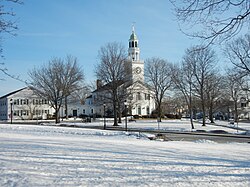Reading, Massachusetts
| Reading, Massachusetts | ||
|---|---|---|
| Town | ||

Downtown Reading in the snow
|
||
|
||
 Location of Reading within Massachusetts |
||
| Coordinates: 42°31′32″N 71°05′45″W / 42.52556°N 71.09583°WCoordinates: 42°31′32″N 71°05′45″W / 42.52556°N 71.09583°W | ||
| Country | United States | |
| State | Massachusetts | |
| County | Middlesex | |
| Settled | 1644 | |
| Government | ||
| • Type | Representative town meeting | |
| Area | ||
| • Total | 9.9 sq mi (25.7 km2) | |
| • Land | 9.9 sq mi (25.7 km2) | |
| • Water | 0.0 sq mi (0.0 km2) | |
| Elevation | 127 ft (39 m) | |
| Population (2010) | ||
| • Total | 24,747 | |
| • Density | 2,500/sq mi (960/km2) | |
| Time zone | Eastern (UTC-5) | |
| • Summer (DST) | Eastern (UTC-4) | |
| ZIP code | 01867 | |
| Area code(s) | 339 / 781 | |
| FIPS code | 25-56130 | |
| GNIS feature ID | 0618232 | |
| Website | http://www.ci.reading.ma.us/ | |
Reading (![]() i/ˈrɛdɪŋ/ RED-ing) is a town in Middlesex County, Massachusetts, United States, 10 miles (16 km) north of central Boston. The population was 24,747 at the 2010 census.
i/ˈrɛdɪŋ/ RED-ing) is a town in Middlesex County, Massachusetts, United States, 10 miles (16 km) north of central Boston. The population was 24,747 at the 2010 census.
Many of the Massachusetts Bay Colony's original settlers arrived from England in the 1630s through the ports of Lynn and Salem. In 1639 some citizens of Lynn petitioned the government of the colony for a "place for an inland plantation". They were initially granted six square miles, followed by an additional four. The first settlement in this grant was at first called "Lynn Village" and was located on the south shore of the "Great Pond", now known as Lake Quannapowitt. On June 10, 1644 the settlement was incorporated as the town of Reading, taking its name from the town of Reading in England.
The first church was organized soon after the settlement, and the first parish separated and became the town of "South Reading" in 1812, renaming itself as Wakefield in 1868. Thomas Parker was one of the founders of Reading. He also was a founder of the 12th Congregational Church (now the First Parish Congregational Church), and served as deacon there. He was a selectman of Reading and was appointed a judicial commissioner. There is evidence that Parker was "conspicuous in naming the town" and that he was related to the Parker family of Little Norton, England, who owned land by the name of Ryddinge.
...
Wikipedia

